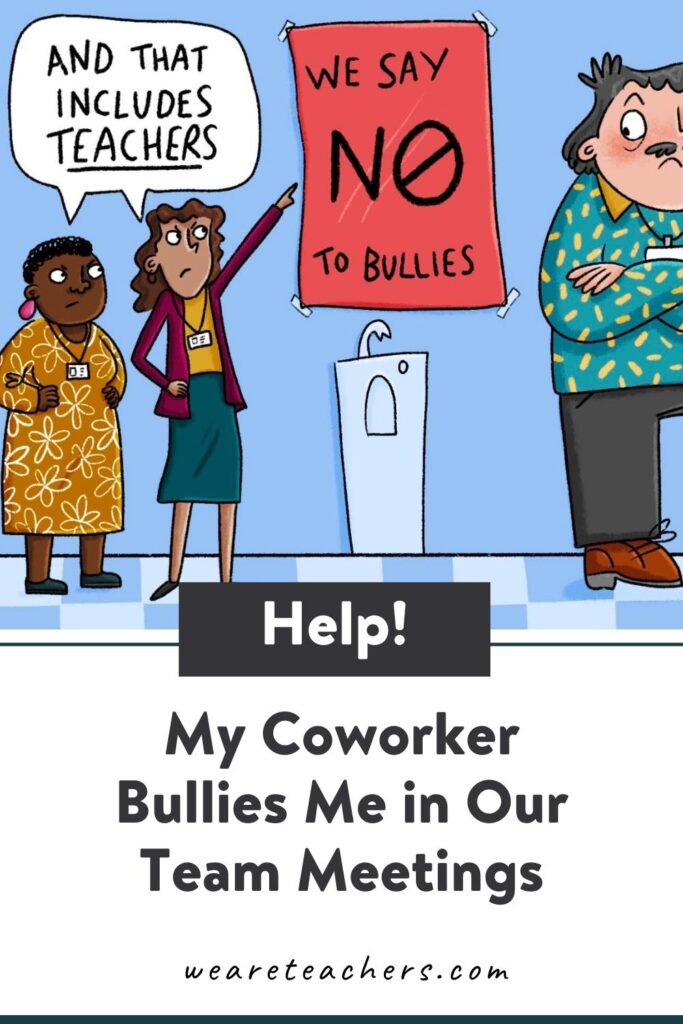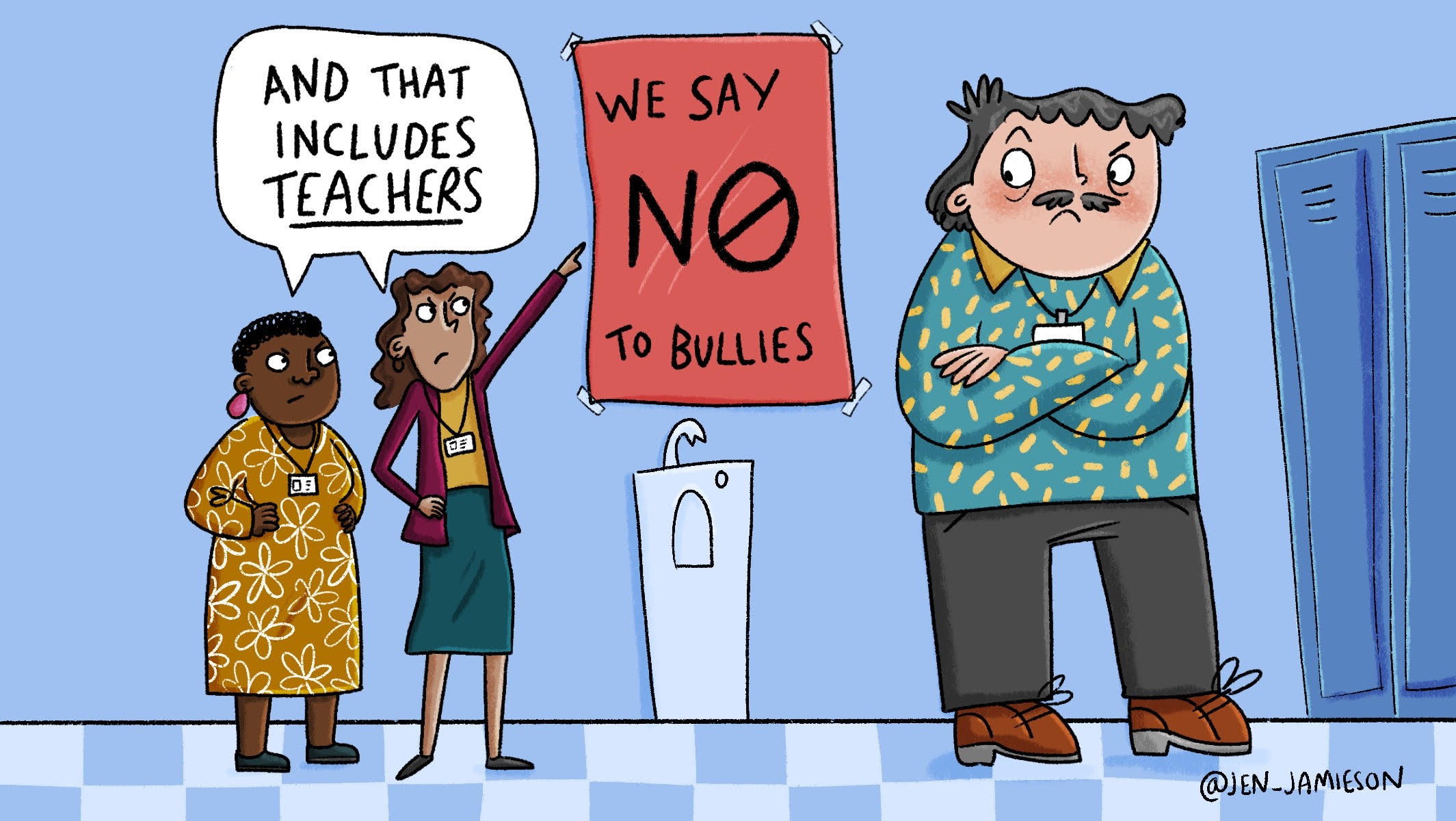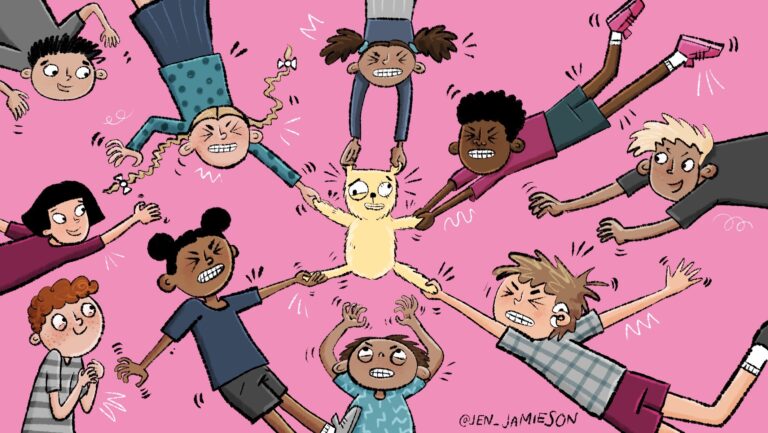Dear We Are Teachers,
I’m a new 6th grade teacher. I’m loving this year so far except for one thing: There’s a bully on my team. During our weekly planning meeting, any comment or suggestion I make is immediately dismissed with, “That will never work,” or “That’s not how we do things here,” often with a joke about how young or inexperienced or overoptimistic I am. Another teacher on my team agrees with me that she’s rude to me, but she’s afraid of her too! How do I stand up to her?
—Suffering From Doormat Fatigue
Dear S.F.D.F.,
New teachers have a lot to learn—but they also have a lot to teach experienced teachers! It’s really unprofessional for this teacher to make you feel like you’re not a valued part of the team.
The next time this teacher shuts down one of your ideas, approach her privately during lunch or a prep period and say, “Hey—I was wondering if I could learn more about why [idea] wouldn’t work.” If she’s vague (e.g., “It just wouldn’t work”), push her for specifics. Is it not a best practice for some reason? Has she tried it before? Is it ineffective because of some factor specific to your school?
You could also just do things your way, then compare results. Bring it up the next time your ideas get squashed.
You: (Shares brilliant idea)
Bully: That’ll never work.
You: The last time I did it with my students, I got 97% mastery for that skill on our assessment—with a 16% increase from their formative assessment, I’d say that’s pretty effective.
In my experience with bullies, they tend to shut up pretty fast when they realize someone’s actually going to challenge their rudeness.
But if after either of these approaches she’s still raining on your parade, it’s time to be more direct. “I want to be helpful, but it feels like my ideas never get considered. It makes me feel like I shouldn’t contribute at all in group meetings. What’s your perspective?” With a question like that, she has to engage with the impact of her behavior.
Dear We Are Teachers,
I got a nice new single-serve coffee maker for my birthday over the summer. Seeing it in my room during in-service, my principal—whose office is next to my room—said, “I might have to borrow that!” Wanting to be polite, I said, “You’re welcome to it anytime!” But now, she interrupts my classes Every. Single. Day. Every time, my second graders crane their necks and gawk, and I have to regain their attention all over again. It drives me nuts. What should I do?
—Having Serious Politeness Regrets
Dear H.S.P.R.,
This one is funny to me because I know it wouldn’t annoy me. In fact, I’d probably be the principal in this case, ha!
But I do understand that what is a non-issue for one teacher might be a constant stressor for another. I assume that because you didn’t mention talking to your principal about it, that solution is off the table. (I get it—I was that way too for a long time.)
The best solution, I think, is to have your students practice how to respond when you have an unexpected visitor.
- Talk to your students about who might come into the classroom while you’re teaching and why. Clarify with them that it could be for lots of things. A technician fixing something, a fellow teacher, a student who left something behind, someone observing how they learn, etc.
- Set your expectations for behavior. It’s normal to notice someone coming in and glance briefly, but we don’t stare or stop what we’re doing.
- Have them practice! Get student volunteers to pretend to be people coming into the classroom for various tasks. You pretend to be a student. Do several rounds and have the rest of your students rate how well you followed the procedure—and definitely make sure to stick some comically bad, bug-eyed staring in there. They LOVE to be in the position of “grading” their teacher!
This should help tremendously with their distractions—and yours—when your principal comes in for some much-needed coffee.
Dear We Are Teachers,
The high school where I teach made the switch to being a “no homework” school this year. This is great in theory. But as the only AP Literature teacher at my school, I’m finding it impossible to get through the curriculum with any kind of fidelity while respecting the homework boundary. Especially with the texts we’re supposed to read—in class?! I’ve talked to my principal about my worries that the AP test scores this year will reflect a watered-down curriculum, and he told me to “get creative.” What does that mean? Does he just not get it?
—Very Creative, Still Confused
Dear V.C.S.C.,
This would have been me upon hearing your principal’s suggestion to “get creative”:

First, your principal has to realize that in humanity’s current relationship with space and time, you cannot get through the curriculum if you can’t assign reading as homework. Reading at home has to be an exception to the no-homework policy. Period. If he’s not getting it, show him the math. Make graphs. A PowerPoint. Puppet show. Whatever it takes.
As long as reading can be done at home, I think you should be able to work with the curriculum. Assign longer essays as in-class timed writes. Use short stories for in-class discussions. It’s not ideal, but it’s doable.
However, if he refuses to budge on reading as homework, get him to clarify the impact you expect this to have in writing. Run something like this by your union rep before emailing it:
“Even with creative modifications, sacrifices will have to be made to the AP curriculum. It’s my professional opinion that this will result in lower scores. I understand and respect the no-homework policy, and will continue to teach to AP standards for rigor within those guidelines as much as time allows. It would help me to have your reassurance in writing now that your directive is to prioritize the no-homework policy over assigning the traditional AP course load—especially if families are disappointed in scores, or if lower scores are used as a part of my evaluation.”
I can’t imagine a principal who wouldn’t tire-squeal a 180 after being reminded of low test scores AND angry families.
Do you have a burning question? Email us at askweareteachers@weareteachers.com.
Dear We Are Teachers,
After learning a thing or two my first year of teaching second grade, this year I decided on a new class norm: You do not have to share. Last year I saw way too many kids upset after feeling pressured to share something, only to have the other person break it, lose it, damage it, or just never return the favor. I thought I created space for a way my students could practice setting boundaries, but instead I’ve created a monster. My department chair thinks I’m being stubborn, parents are livid, and my principal is threatening to tell his boss if I don’t walk this one back. Who is right?
—SHARING IS ENSNARING


